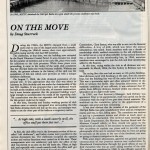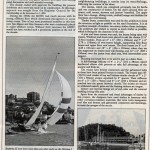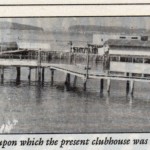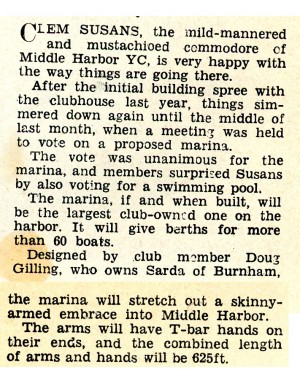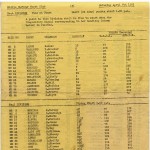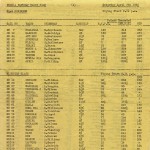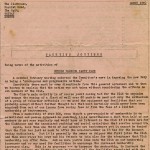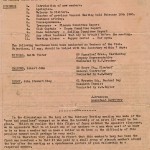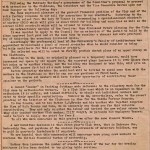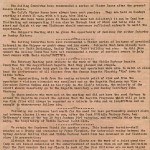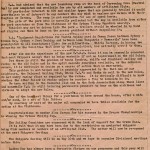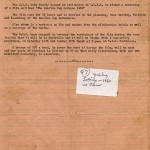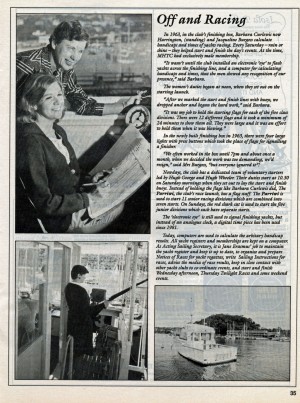| Middle Harbour Yacht Club 1960s |
|---|
Middle Harbour Yacht Club 1960s
On the Movie |  The Spit Baths before their purchase by MHYC in 1963 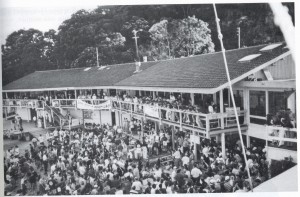 Season opening at Clubhouse - mid 90s 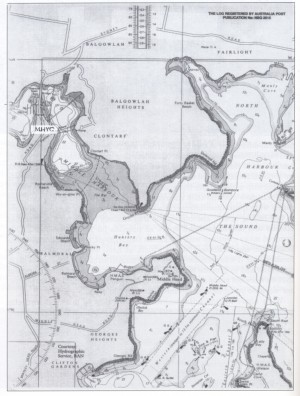 Chart of Middle harbour On the Move From MHYC: The First 60 Years Article by: Doug Sturrock Published 1999 During the 1960s, the MHYC changed from a small yacht club to one of the largest in Australia. During the 1960/61 season, there were approximately 80 yachts racing and the club had 400members. The clubhouse, at that time, was the building now occupied by the Royal Volunteer Coastal Patrol. It soon became too small for the number of MHYC members and in the early 1960s plans were made for additions to the club premises. While these plans were proceeding, it came to the notice of the yacht club committee that the Old Spit Baths site would become available. Without doubt, the greatest advance in the history of the club was the acquisition of this site, which now provides us with a unique foreshore clubhouse. On August 7, 1963, the club obtained possession of its present site. It was appropriate that the club was about to celebrate its 25th birthday, and was under the chairmanship of HE Godden. It was proposed that a new clubhouse would be built at the southern end of the site, of concrete construction, but it soon became apparent that this building would not be large enough to accommodate the needs of the expanding club. The construction would also have been too expensive, and finally the finance for this project could not be raised. At this time, Saturday and Sunday working parties of club members came to remove corrugated iron surrounding the Old Spit Baths dressing sheds and tidy up the area, and attempts were made to use the outer part of the baths as a temporary marina. At first, the club office was in the downstairs section of the so-called 'old clubhouse', and locker rooms were provided in the current downstairs bar. The clubhouse occupied the upstairs section and various functions were carried on in this area. These arrangements were not satisfactory and later, the office of the club was moved to an area on the old baths site. Often, at high tide, and especially with a south-easterly swell, the office staff got their feet wet when the water sloshed through the floor! By the mid1960s the MHYC was experiencing financial difficulties, and it was obvious that improvements to the clubhouse were necessary. Because of general dissatisfaction with the committee, a completely new committee was elected, except for one member. This new committee was chaired by a new Commodore, Clem Susans, who was able to sort out the difficulties. A levy of 20 pounds, which was twice the annual subscription, was raised. Some members took out a decade of membership which enabled renovation to the old clubhouse to be carried out at a cost of about 8,000 pounds. 1965, associate members were encouraged to join the club and their membership added to the finances. It was now obvious that the remains of the perimeter of the Old Spit Baths were quite unsatisfactory to use as a temporary marina, and were in fact falling apart. The committee was anxious to put up a permanent marina and obtain as much space as possible for its construction. This involved many meetings with the Lands Department, the Maritime Services Board and the Mosman Council which, at first, would not agree to the construction. It was necessary to meet the council on two occasions to explain our plans and to provide aerial photographs of the area to convince them that we were not going to encroach on the access to the rest of the foreshore, nor were we going to obstruct navigation in the area. With some minor adjustments, approval was granted and the construction of our present marina was undertaken by Hornibrook Constructions, through the good offices of one of their executives who was also an active sailing member of the club. The marina was completed in 1968. It was apparent that a new clubhouse also needed to be built. At this time, racing within the club in all divisions was very successful. Most divisions raced with handicaps at the start, from the starter's boat, and the finishing line was off the yacht club. This was a spectacular sight and often attracted visitors to the club to witness the finish. One Saturday afternoon, to the immense confusion of race officials, it was estimated that 27 yachts from different divisions finished within one minute, with spinnakers up in a light south-easter. By 1966, the club had 716 members, including 100 associates, and a few junior members. There were 140 yachts in seven divisions and, for the first time, a Waiting list for membership. In 1968, Sir Roden Cutler, the Governor of New South Wales, and Sir Garfield Barwick became honorary club members. The decade ended with approval for building the present clubhouse and a start was made on its construction. Other ArticlesClem Susans, the mild-mannered and mustachioed commodore of the Middle Harbour Yacht Club, is very happy with the way things are going there, After the initial building spree with the clubhouse last year, things simmered down again until the middle of last month, when a meeting was held to vote on a proposed marina. the vote was unanimous for the marina, and members surprised Susans by also voting for a swimming pool. The marina, if and when build, will be the largest club0owned one on the harbour. It will give berths for more than 60 boats. Designed by club member Doug Gilling, who owns Sara of Burnham, the marina will stretch out a skinny-armed embrace into Middle Harbour. The Arms will have T-bar hands on their ends, and the combined length of arms and hands will be 625ft. Modern Boating December 1965 |
Racing | In 1960, "Siandra" won the Cruising Yacht Club of Australia's first Blue Water Championship. Throughout the 1960s and 1970s, MHYC yachts and their crews took many racing honours with boats such as "Carmen", "Cavalier", "Cadence", "Moonbird" and "Janzoon II" all prominent winners. At the club's 25th anniversary a new race from Sydney to Brisbane was created to be a feeder for the Brisbane-Gladstone Race. Again, MHYC yachts were winners, with "Cadence" and "Carmen" coming 1st and 2nd in the inaugural event. In 1969, famous yacht designer and builder, Ron Swanson, on "Sundowner", made MHYC proud by taking out the double of line and handicap honours in the Brisbane-Gladstone Race. In 1972, the race fleet was hit by a cyclone and only six yachts finished with Peter Hopwood's, "Harmony" battling on through incredible 112 mph winds to win! In 1965, MHYC placed eleven members in the first Australian Admiral's Cup Team and internationally the club started to make its mark with many honours over forthcoming years going to names such as Ron Swanson, Doug Gilling, Hugh Treharne and Warren Johns. 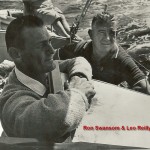 1964 Ron Swanson and Leo Reily 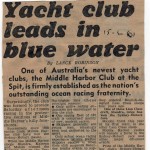 Middle Harbour Yacht Club leads in the Blue Water 1961 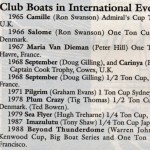 Club Boats in International Events The Bluebirds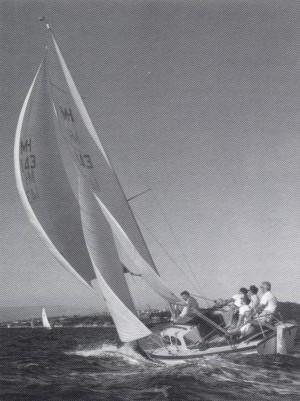 Deryn Glas (Keith Jones) on Sydney Harbour in 1966 In the late 1960's, there were around 37 Bluebirds sailing regularly on a scratch start at MHYC. There sheer number and camaraderie helped saved this club during this period. At the end of the racing they used to all tie up at the MHYC jetty and have a rip roaring time at the club.
The Bluebirds by Keith JonesThe Early Years MHYC: The First 60 Years Article by: Keith Jones Published: 1999 The Bluebirds In the mid-1960s the Bluebird Division was a powerful force in Middle Harbour Yacht Club. Cruises were made to further flung yacht clubs for the state title series. Bluebirds went as far as Port Stephens - perhaps further. At least one Bluebird competed with the Junior Offshore Group. In 1961 I bought a 22-foot Bluebird-class yacht. It was purchased as a fibreglass shell and delivered using a truck from Firefighting Equipment 'commandeered' by Alan Keirle to 22 Lavoni Street. Ateam of friends carried the shell up the front lawn where it was set up on a concrete patio built for the purpose. I named it Deryn Glas, which is Welsh for bluebird. Timber interior fittings, bulkheads and so on were built over a two-year period. My late cousin, Les Atkins, a carpenter and cabinet maker, was of great assistance. Others who were to form the crew - Bev Bashford, Alan Keirle, Alan Ponton, Alan Underwood, Peter Polman and Vic Halloran -contributed time and labour. In late 1963, having missed the start of the season, Deryn Glas was taken to Clontarf where John Jeffress fitted the cast-iron keel. When collected from the foundry the keel was over 100 pounds too light. To compensate for this, the lead ballast, put in the bilge for compliance with the waterline measurement, was removed. Plaster of Paris moulds in boxes of sand were made. John MacCallum assisted Alan Ponton melting the lead and making 'plugs' in the moulds. These fitted the appropriate areas very well and added to the yacht's stability. The aim of reducing windage was taken into account when building the cabin hatch and other deck fittings. The main sheet hawse was designed with a curve to encourage the mainsheet to be more central when on a wind, but to run out towards the gunwales when running. There had been stories of Bluebirds having trouble rounding up on spinnaker shy runs. For that reason I took the plan's rudder design and enlarged it significantly in all directions. It also had a beautiful aerofoil cross-section and a square, non-breakaway edge along its bottom. The mast and rigging were made by Peter Cole, then in Marrickville. He also made us a beautiful suit of sails. Deryn Glas was launched on 16 November 1963 (the day on which in the President Kennedy's assassination was reported in Australia). From the first moment putting the yacht hard on the wind, it was evident to me that we had something exceptional. She was beautifully balanced, responsive to the helm and a sheer delight to sail. This was proven subsequently when a number of other skippers won races in the yacht, on occasions when I was unavailable. The first start was a Wednesday afternoon race (in days when a larger fleet turned out than today). Deryn Glas won on handicap. The first start in the Bluebird Division resulted in a third place in the scratch start event. She went on to win the Autumn Point Score of 1963/64. The Bluebird Division of those days provided great racing. The little boat could be used for racing, day sailing and even holidays aboard. Accommodation aboard was cramped and on Deryn Glas we used a boom cover which allowed greater use of the cockpit and even allowed that area to be used as the galley when anchored. We customarily spent a week or more aboard at Cowan Creek just before Christmas each year - two adults, three children and a dog! Bluebird Division racing was great, with Ron Ewen (Karalee II) being champion in the early 60's. Tim Wilson was very competitive but departed for greater things in mid-1960. Toni Redstone (Mandy) was always to the fore. He went on to win a World Title in the Thunderbird class in California. Albert Byrom (Erps Kwerps) was great in light Weather. Doug Brooker built a timber Bluebird with a lead keel in the mid-1960s, and although he acquitted himself very well, the craft could not always pace the fibreglass version. Other famous Bluebird names were Bill Liddell, David Noakes and Hewan Greenwood, who was exceptionally good. There are several still racing with MHYC - Keith Poole and Ben Nossiter for example. John Conroy Snr commenced sailing at an advanced age and went through some traumas in his early learning period, but tenaciously honed his skills to become the best Bluebird sailor in the Division in Lotchen III in the late 1960s and early 1970s, with the aid of his son, John Conroy Jnr, who still sails with MHYC. About 1964 there was a Saturday afternoon race held in Sydney Harbour in a north westerly which was recorded at the Sydney Observatory Weather Bureau at 84 knots! Only two divisions of MHYC completed the course. One was the Offshore Division. The other was the Bluebirds. Deryn Glas won from Mandy after having to cover Mandy (in atrocious conditions) on one Work up to Fort Denison. Coming up Middle Harbour towards the finish, Deryn Glas was flattened by a gust which put the spreaders in the water and forced in the coach house windows. Alan Keirle fell vertically from the weather gunwale into the water to leeward, without hitting any part of the boat on the Way. The cockpit ropes then fell onto him, and as the boat righted itself, he could not get his head above water. Alan Ponton, with great presence of mind, reached over and pulled him head and shoulders above the water surface. Deryn Glas took a lot of water, but finished without further trouble. More robust coach-house windows were fitted. Deryn Glas won only one state title, in 1966, though she was placed in five. (Difficulty beating Gerry Garrett of RPAYC was the problem.) She won a total of 134 races. 1972 was the last state title in which she competed, coming third. MHYC 1962 April 7th List of CompetitorsList of Competitors
|
1960 Jottings |
1963 | Off and Racing: Women in Charge - 1989 Golden Jubilee BookIn 1963, in the club's finishing box, Barbara Curlewis now Harrington, (standing) and Jacqueline Burgess calculate handicaps and times of yachts racing. Every Saturday - rain or shine - they helped start and finish the day's events. At the time, MHYC had exclusively male membership. "It wasn't until the club installed an electronic 'eye' to flash yachts across the finishing line, and a computer for calculating handicaps and times, that the men showed any recognition of our presence,' said Barbara. The women's duties began at noon, when they set out on the starting launch. 'After we marked the start and finish lines with buoys, we dropped anchor and began the hard work," said Barbara. "It was my job to hold the starting flags for each of the five class divisions. There were 12 different flags and it took a minimum of 24 minutes to show them all. They were large and it was an effort to hold them when it was blowing." In the newly built finishing box in 1963, there were four large lights with press buttons which took the place of flags for signalling a finisher. 'We often worked in the box until 7pm and about once a month, when we decided the work was too demanding, we'd resign,' said Mrs Burgess, "but everyone ignored it"! Nowdays, the club has a dedicated team of voluntary starters led by Hugh George and Hugh Wheeler. Their duties start at 10.30 on Saturday mornings when they set out to lay the start and finish buoys. Instead of holding the flags like Barbara Curlewis did, The Parriwi, the club's race launch, has a flag staff The Parriwi is used to start 11 senior racing divisions which are combined into seven starts. On Sundays, the red shark cat is used to start the five junior divisions which each have separate starts. The 'electronic eye' is still used to signal finishing yachts, but instead of an analogue clock, a digital time piece has been used since 1981. Today, computers are used to calculate the arbitary handicap results. All yacht registers and memberships are kept on a computer. As Acting Sailing Secretary, it is Jane Erasmus' job to maintain the yacht register and keep it up to date, to organise and prepare Notices of Races for yacht regattas, write Sailing Instructions for races, advise the media of race results, keep in close contact with other yacht clubs to co-ordinate events, and start and finish Wednesday afternoon, Thursday Twilight Races and some weekend events. |
Origin of Wednesday Prawn Day | 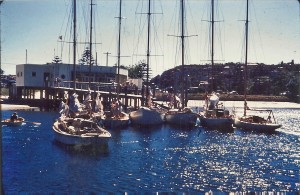 Middle Harbour Yacht Club in Dec 1954 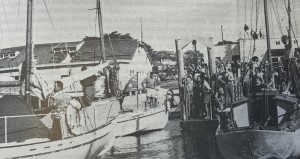 MEMORIES OF WEDNESDAY AFTERNOON SAILING IN THE 1960'S AND THE ORIGIN OF THE PRAWN DAYStory by Peter Young I started sailing in the summer of 1967 with Bill Burns on Carinya, a Carmen. At that time there was no mid-week racing at any other club in Sydney and though the race was held at MHYC it was not an official club race. The race was conducted by Noel Clack and his wife Joan. There were usually about 15 starters and it was the same course every week, the first mark was the Can Buoy near Lady Bay then Fort Denison and back around the Can Buoy (P) to the finish. Clackie fired a shotgun from the starters box for a flying start and as there were no handicaps he would award the place getters as to whom he thought had sailed a good race dependent on the conditions. The owners paid Clackie an entry fee, which after the race expenses, provided him with sufficient funds for his afternoon drinks and he also put enough money aside so that at Christmas time he could put on the 'prawn day'. At this time there was only the Old Clubhouse, without the deck and current Bar area, and the decrepit old change rooms and toilets from the former Swimming Baths. The Marina was the former Swimming Pool enclosure with a section cut out of the front to provide an entry with mooring poles on the inside and the outside. Bob Quinn was the 'self appointed' crew organizer, so often on arrival Quinnie would inform you that you would not be sailing on your regular boat but on another as it was short of crew. Whether that was a bigger faster or smaller slower boat you happily accepted and so everyone got to know each other. After the race was quite a social occasion as it was prior to the breathalyzer and as several of the boats were moored on the west side of the Bridge the owners had to wait till the 7pm opening. Also others would stop off on their way home for a few drinks. You knew almost everyone including Maurie the barman. Some of boats were fiberglass, some timber and a few were steel. Regular boats and owners included: Solitaire - Swanson 27( Mike Vaux) Shimaal -Mercedes II 42' steel Kaufman (Cam Earl) Du Ma Le - classic timber boat(Leo Riley) Carinya"- Carmen (Bill Burns) Amity - Diamond (Andrew Spring) Bettina - Eddie Nicholls (Snr) Barrima II - Daydrean ( Ron Derryn) Briajea - 23' Vander Stat (Allan Shilland) Marsude - (Bob Phipps) Windsong -28' fiberglass (Martin Clarke) and Jim Choice an Endeavour 24. And 2 un-named boat design Carmen (Geoff Edmons) and an Endeavour 24 (Jim Choice) Eddie Nicholls Jnr (Fast Eddie) still has some of his father's 8mm film on Wednesday sailing When Noel and Joan Clack moved to the Sunshine Coast, MHYC made Wednesday sailing a club race and in the early 1970's commenced Thursday Twilights. |



